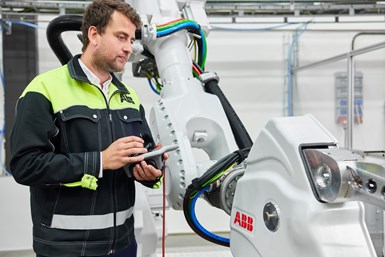ABB's Expanded Robot Lineup Provides Sustainable Production
The next-generation models are suitable for payloads ranging from 150 kg to 310 kg, with a reach from 2.5 m to 3.2 m.
Share





ABB Robotics is expanding its robot range with four new models and 22 variants, offering more choice, increased coverage and greater performance. The next-generation models include the IRB 6710, IRB 6720, IRB 6730 and IRB 6740, suitable for payloads ranging from 150 kg to 310 kg, with a reach from 2.5 m to 3.2 m.
“Sustainable production is a major priority of automotive manufacturers,” says Marc Segura, president of ABB’s Robotics Division. “ABB’s four new robots offer 22 variants and energy savings of up to 20%, responding to our customer’s needs; offering more choice and greater flexibility for more sustainable production. These new robots will help our customers build resilience across a range of industries including automotive, general manufacturing, foundry, food and beverage and logistics.”
The improved energy efficiency is driven by ABB’s OmniCore controller and a lighter robot design, leading to energy savings of up to 20%. OmniCore also offers high motion control accuracy. Featuring ABB’s TrueMove and QuickMove motion control technology, the robots can reportedly achieve repeatability with a minimum of 0.03-mm deviation. These capabilities make the new series of robots ideal for complex tasks such as spot welding, laser welding, screwdriving and riveting, enabling automotive manufacturers to achieve high-quality assembly.
Joerg Reger, managing director of ABB Robotics Automotive Business Line, says, “Our new robot range meets the needs of the rapidly growing electric vehicle (EV) industry. As manufacturers ramp up production of EVs and batteries, they can choose from a wide range of ABB robots to ensure they have the right variant to handle batteries of varying sizes, from individual cells and modules to complete packages. They can also perform tasks such as high-precision car body assembly and spot welding, and enter restricted areas within a vehicle to install seats or dashboards.”
Related Content
-
4 Steps to a Cobot Culture: How Thyssenkrupp Bilstein Has Answered Staffing Shortages With Economical Automation
Safe, economical automation using collaborative robots can transform a manufacturing facility and overcome staffing shortfalls, but it takes additional investment and a systemized approach to automation in order to realize this change.
-
Which Approach to Automation Fits Your CNC Machine Tool?
Choosing the right automation to pair with a CNC machine tool cell means weighing various factors, as this fabrication business has learned well.
-
Same Headcount, Double the Sales: Successful Job Shop Automation
Doubling sales requires more than just robots. Pro Products’ staff works in tandem with robots, performing inspection and other value-added activities.






















